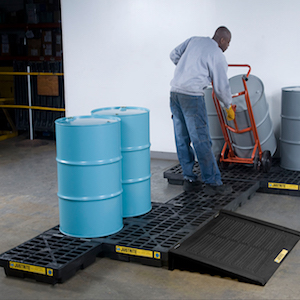News - Spill Containment - Justrite
Slips and falls can be fatal in the workplace. In 2017, falls were the second highest cause of occupational death according to the U.S. Department of Labor. They accounted for 887 fatalities on the job. An estimated 25 percent of all disability claims per year, amounting to more than $25 billion, result from falls.
READ MORE
55-gallon drums are a versatile and convenient storage method used in many different industries. They store everything from lubricating oils to diesel and hazardous chemicals. While popular and easy-to-use, they also pose some risks.
Flammable storage cabinets arrive at a site on pallets, often carried by forklift to their station. Keeping the flammable safety cabinet on a pallet may seem convenient. It makes it easier to move. It might also seem like a good idea to keep it elevated off the floor, so that any leak or chemical spill will be visible.
Any workplace using chemicals or oils has the potential for a spill. These occur when a product escapes from its primary container, which could be anything from a 55-gallon drum to an IBC or even a bottle.
Many industries use 55-gallon drums to store and move chemicals, oils and other products. Storing materials close to their point of use is convenient for operations. In the cases of certain machinery and equipment, this means storing some drums outdoors, even if most of the drums remain in a central warehouse.
In 2017, the National Response Center (NRC) received over 24,000 reports of spills into the environment, which equals about 65 spills per day. This number excludes leaks and spills that companies contained on their own sites. The NRC falls under the Environmental Protection Agency (EPA).
Whether you are dealing with a widespread spill on the scale of Deepwater Horizon, or a few drips from a leaking pump seal, every spill must be cleaned up. But did you know using the wrong absorbent material may make the situation worse?
The best way to deal with a spill is to stop it before it even happens. If that’s not possible, provide spill containment at the source, so that it cannot spread into the environment. Spills of oil and hazardous chemicals spread quickly, especially when they reach water. Even a small amount of oil will cover a large water surface area.








No comments:
Post a Comment